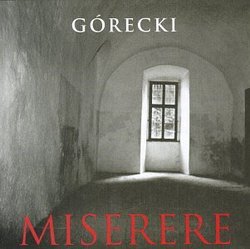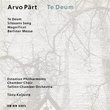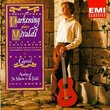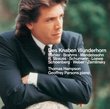| All Artists: Henryk Gorecki, John Nelson, Lucy Ding Title: Górecki: Miserere Members Wishing: 0 Total Copies: 1 Label: Nonesuch Release Date: 11/15/1994 Genre: Classical Style: Opera & Classical Vocal Number of Discs: 1 SwapaCD Credits: 1 UPC: 075597934823 |
Search - Henryk Gorecki, John Nelson, Lucy Ding :: Górecki: Miserere
 | Henryk Gorecki, John Nelson, Lucy Ding Górecki: Miserere Genre: Classical
![header=[] body=[This CD is available to be requested as disc only.]](/images/attributes/disc.png?v=a4e11020) ![header=[] body=[This CD is unavailable to be requested with the disc and back insert at this time.]](/images/attributes/greyed_disc_back.png?v=a4e11020) ![header=[] body=[This CD is available to be requested with the disc and front insert.]](/images/attributes/disc_front.png?v=a4e11020) ![header=[] body=[This CD is unavailable to be requested with the disc, front and back inserts at this time.]](/images/attributes/greyed_disc_front_back.png?v=a4e11020) |
Larger Image |
CD DetailsSimilarly Requested CDs
|
CD ReviewsA triumph and yet a pity Grady Harp | 07/29/1999 (3 out of 5 stars) "On this disc, the Chicago Symphony and Opera Choruses explore three powerful sacred works by this remarkably tranquil composer whilst the Lira Chamber Chorus looks at secular works in his native language. As far as the singing and direction goes, this is a brilliant performance- attuned to the passion and the detail in the music. Although these works are not without their problems- "Miserere" is half an hour long, and "Amen" and "Euntes ibant" both feature harmonies that are (to say the least) harrowing on the ear and on the mind- they are a fine selection indeed. However, if I were Gorecki I would be ready to throttle the producers: the recording is cluttered with background noise such as a door slamming, a heavy vehicle passing (to say nothing about the constant 'dripping' sound that comes through the music particularly early on). Were it not for this, this disc would have my highest recommendation. Nonetheless, I will say that for those who can 'digest' it, this is pure and austere music that is simply written and sensitively performed. In particular, I find "Wislo Moja, Wislo Szara" to be wonderfully haunting and very reflective of the troubled country from which it originates." Power of the Human Voice in Concert: Hope for Brotherhood Grady Harp | Los Angeles, CA United States | 02/23/2005 (5 out of 5 stars) "Henryk Gorecki is able to achieve so much power and transcendence with so very little that his music for unaccompanied chorus stands as a metaphor for we as the global community cold achieve if we believed in the motivation that soars through this selection of music. MISERERE is a stunning work, a response to the political upheaval in Poland that surrounded the United Peasant Party in 1981 when members of the Rural Solidarity were slaughtered by the militia. In response to this Gorecki immediately composed this work for large unaccompanied chorus which for the first thirty minutes intones the words 'Domine Deus Noster' (Lord our God), first by massive male voices intoning, plea-like, then joined by women's voices in agitation and ultimate reverence, adding only are the very end the words 'Miserere nobis' (have mercy on us). If any listener fails to be moved by this quiet, urgent, sonorous plea for peace, then we as a universal people have much work to do! Appropriately, MISERERE is followed by a performance of Gorecki's AMEN. Again, this work does not change key, uses only the single word 'Amen' as text, but packs so much power and finally closes with the choral forces closing the 'n' in sustained echo. Following the simplicity of this six-minute work is Gorecki's first work composed for unaccompanied voices - the Psalms setting titled EUTES IBANT ET FLEBANT and is reminiscent of the mood of his now famous "Symphony of Sorrowful Songs". And dating back to the year of MISERERE is his setting of 'My Vistula, Grey Vistula', a brief but compelling setting of the folk music of Poland. The final work on this very fine recording is a secular setting of Polish folksongs SZEROKA WODA, charming in its simplicity and unfettered by complicated messages or writing. The Chigago Symphony Chorus and the Chicago Lyric Opera Chorus are impeccably conducted by John Nelson for the first four works and the Polish Folksongs are performed by the Lira Chamber Chorus conducted by Lucy Ding. The sound of the recording is resonant and rich and I must admit that the music speaks so strongly on this recording that I was not hampered by the extraneous sounds mentioned by other reviewers. And there may be a message there about priorities and responses... Highly Recommended. Grady Harp, February 2005 " Bumps, Crashes and Beautiful music Lorin Kee | Thompson's Station, TN United States | 07/01/2004 (4 out of 5 stars) "Beautiful singing. It's unfortunate that some poor guy was made to fold chairs in the room throughout the entire recording. I only wish this was an exaggeration. Listening in the car may alleviate some of the problem . . ."
|

 Track Listings (9) - Disc #1
Track Listings (9) - Disc #1








